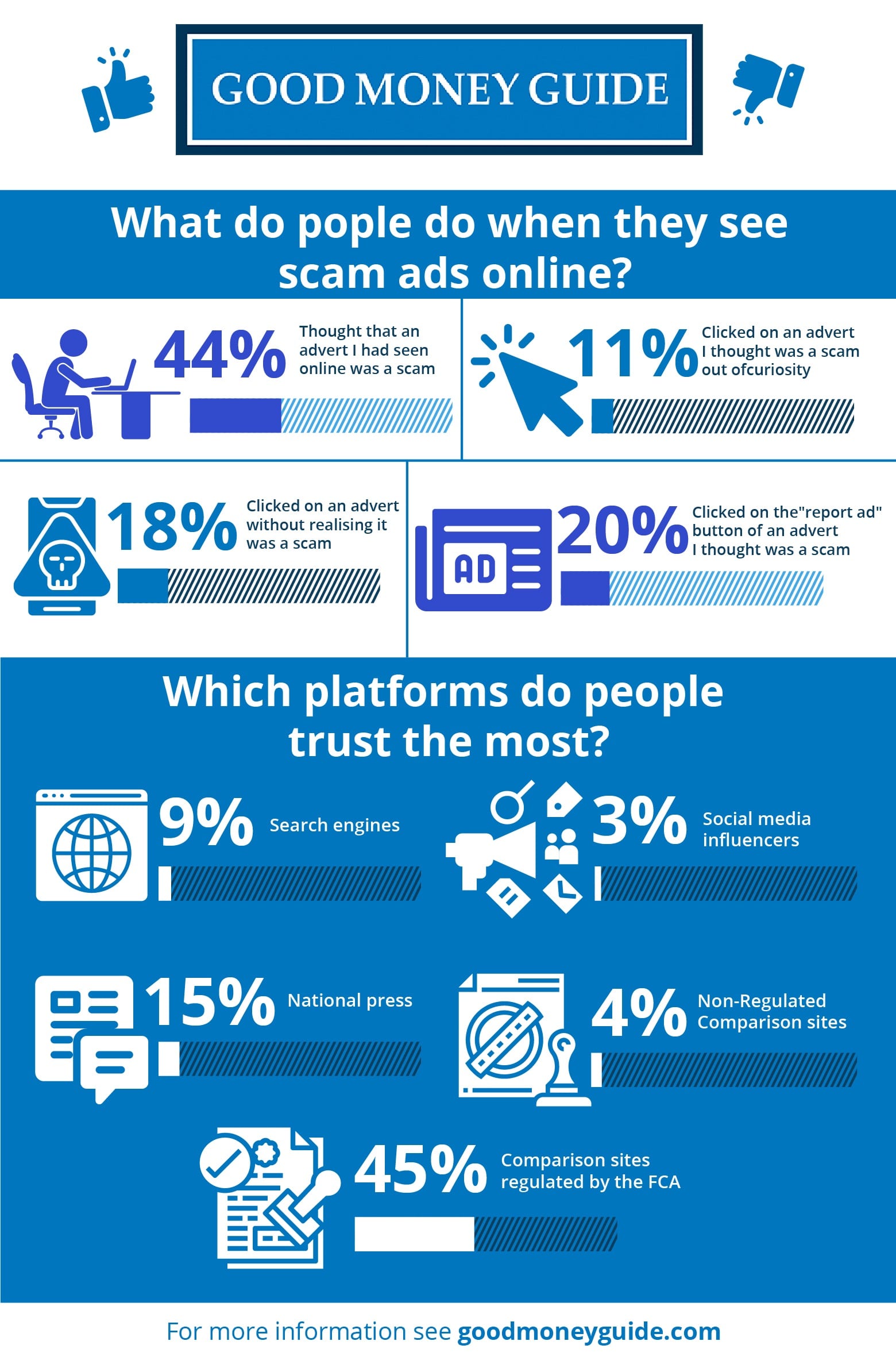Social media influencers are the least trusted to advertise financial products, with only 3% of those surveyed saying they trusted them. This is a relief because the majority of people on social media don’t have a clue about complex financial products and most are Instagram scammers anyway.
It was refreshing to note that when The Sunday Times Influencer List 2019, was released. There was nobody finance-related in it and they hadn’t unwittingly been hoodwinked into promoting investment scams.
That doesn’t mean to say that everyone on social media is a trickster. When we interviewed Raoul Pal, CEO of Real Vision, he recommended the FinTwit list as a great source of trading ideas and macroeconomic commentary. In fact, when you look at the recommended reading from all our CEO interviews, Twitter is a regular feature.
Regulated comparison sites are the most trusted source of online financial advertising
45% of those surveyed said they trusted financial adverts on comparison sites that were regulated by the FCA.
However, if a comparison site is not regulated by the FCA, that percentage drops to 4%, only slightly higher than social media influencers. Not surprising really, unscrupulous comparison sites acting as marketing agents for scammers promising high returns for bogus investment schemes. We covered this when we looked at bond scams and how investors were tricked into thinking they could get a return of up to 13% using mini-bonds.
I suppose this is because, if you are regulated you have to behave properly, have the relevant risk warnings and are in danger of either being finned, banned or generally ticked off. Which aside from being very embarrassing is not good for business.
In order to get regulated, there is a lot of due diligence conducted by third parties. Regardless of whether you are an appointed representative of another regulated firm, or have a direct regulation, it means that qualified compliance officers have investigated your business initially and on an ongoing basis.
Of course, being regulated isn’t foolproof as dodgy firms can still get it by getting regulated offshore and then passporting that regulation in. As many do from Cyprus for example where it is much easier to get regulated.
Financial adverts on search engines are only trusted by 9% of those surveyed.
This makes sense. It’s so easy to set up an AdWords account and start advertising on specific keywords and searches.
Not surprising as 43% of those we surveyed claimed to have seen a scam advert online. Google has banned cryptocurrency advertising, but adverts still slip though the net.
Scam adverts seem to be remarkably effective as between 11-18% said they have click on a scam advert, either out of curiosity or because they didn’t realise it was a scam.
Worryingly, only 20% of people said that when they saw a scam advert they reported it to the ad network with the “report ad” feature.
National press articles and financial promotions only trusted by 15%
Not surprising really at the click of a button anyone who can advertise on Google through Adwords can also advertise on the websites of newspapers.
But what’s worrying about this is the distinction between journalism and advertising. For instance, if a journalist or news feed displays an article or advertorial saying how great something is, I think you are more likely to believe it. Especially as major media networks have in the past been hoodwinked into unwittingly promoting investment scams.
Scam Financial Promotion Survey Results
Our survey into attitudes of online advertising was commissioned by the Good Money Guide. This survey has been conducted using an online interview administered to members of the YouGov Plc UK panel of 800,000+ individuals who have agreed to take part in surveys. Total sample size was 2034 adults who have savings and investments. All figures, unless otherwise stated, are from YouGov Plc. Fieldwork was undertaken between 15th – 16th January 2020. The survey was carried out online. The figures have been weighted and are representative of all GB adults (aged 18+).
We recently conducted a survey of 2,000 YouGov savers and investors to try and get some insight into attitudes towards online financial advertising.
Survey questions we asked and answers:
Do you trust financial online advertising?
On which, if any, of the following online platforms would you trust a financial advert (e.g. advertisements for bank accounts, investing and trading etc.)? (Please select all that apply)
| Media Platform | Percentage who trust it |
| Search engines (e.g. Google, Bing, etc.) | 9% |
| Social media influencers (e.g. people on Facebook, Instagram with a large number of friends/ followers etc.) | 3% |
| National press (e.g. articles online on DailyMail.co.uk, TheTimes.co.uk etc.) | 15% |
| FCA (Financial Conduct Authority) regulated comparison sites | 45% |
| Non – FCA (Financial Conduct Authority) regulated comparison sites | 4% |
We also asked about attitudes to scam adverts and what people do about them.
For the following question, please think about ANY type of advert you have EVER seen online…Which, if any, of the following have you EVER done? (Please select all that apply) See less
| Have you ever: | Percentage who had: |
| Thought that an advert I had seen online was a scam | 43% |
| Clicked on an advert I thought was a scam out of curiosity | 11% |
| Clicked on an advert without realising it was a scam | 18% |
| Clicked on the “report ad” button of an advert I thought was a scam | 20% |

Richard is the founder of the Good Money Guide (formerly Good Broker Guide), one of the original investment comparison sites established in 2015. With a career spanning two decades as a broker, he brings extensive expertise and knowledge to the financial landscape.
Having worked as a broker at Investors Intelligence and a multi-asset derivatives broker at MF Global (Man Financial), Richard has acquired substantial experience in the industry. His career began as a private client stockbroker at Walker Crips and Phillip Securities (now King and Shaxson), following internships on the NYMEX oil trading floor in New York and London IPE in 2001 and 2000.
Richard’s contributions and expertise have been recognized by respected publications such as The Sunday Times, BusinessInsider, Yahoo Finance, BusinessNews.org.uk, Master Investor, Wealth Briefing, iNews, and The FT, among many others.
Under Richard’s leadership, the Good Money Guide has evolved into a valuable destination for comprehensive information and expert guidance, specialising in trading, investment, and currency exchange. His commitment to delivering high-quality insights has solidified the Good Money Guide’s standing as a well-respected resource for both customers and industry colleagues.
To contact Richard, please see his Invesdaq profile.




